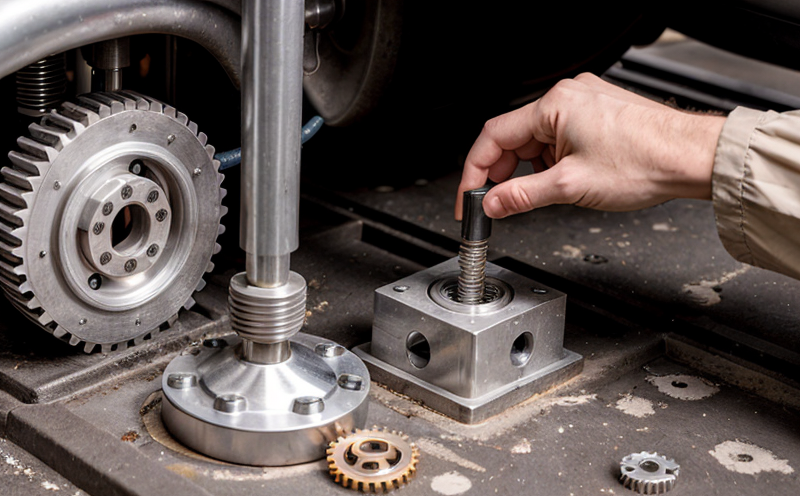ASTM E8 Tensile Testing of Metallic Materials Validation Method Development Test
The ASTM E8 tensile testing method is one of the most widely recognized standards globally for evaluating the mechanical properties of metallic materials. This service focuses on the development and validation of specific test methods to ensure that the tensile testing procedures meet international standards, thereby providing accurate and reliable results.
ASTM E8 specifies a series of standard practices for tension testing materials in plane strain conditions. The tensile test is performed by stretching a specimen to failure under uniaxial loading. This service ensures compliance with ASTM E8 and other relevant standards such as ISO 6892-1, which provides additional details on the testing procedure.
The primary purpose of this service is to validate the tensile testing methods used in laboratories by comparing them against internationally recognized standards. By doing so, we ensure that the results obtained from these tests are consistent and comparable across different facilities worldwide. This is particularly important for industries where quality control and safety are paramount, such as aerospace, automotive, defense, and medical device manufacturing.
During the development phase of a validation method, several steps must be followed to ensure accuracy and reliability:
- Specimen Preparation: The specimens used in tensile testing need to be prepared according to ASTM E8 specifications. This includes ensuring that the cross-sectional area is uniform and free from defects.
- Instrumentation Setup: High-precision instruments are required for accurate measurements during the test. These include a servohydraulic tensile tester capable of providing consistent tension loads throughout the testing process.
- Standard Test Procedure: The procedure should follow ASTM E8 closely, including the rate of loading and the method of data acquisition.
- Data Analysis: Post-test analysis is crucial to determine whether the results meet the required criteria. This involves calculating key mechanical properties such as tensile strength, yield strength, elongation at break, and reduction in area.
The validation process also includes comparing the test results with those obtained from certified reference materials (CRMs) or inter-laboratory comparison programs. This ensures that the method is robust enough to produce consistent results across different testing environments.
Once validated, these methods can be used confidently in quality control and research settings. For instance, in aerospace manufacturing, accurate tensile strength data helps ensure that materials meet strict safety standards. In medical device production, such tests help guarantee compatibility with human tissues without causing undue stress or damage.
The ASTM E8 method is especially useful for validating new testing protocols introduced by laboratories seeking to enhance their services or comply with emerging regulations. By following this service, organizations can demonstrate their commitment to maintaining high standards of quality and reliability in material characterization.
Why It Matters
The importance of ASTM E8 tensile testing cannot be overstated, especially within industries where precision and consistency are critical. Compliance with international standards ensures that the results obtained from these tests are universally accepted and comparable. This is particularly beneficial for businesses operating in multiple countries or collaborating internationally.
For quality managers and compliance officers, ensuring adherence to ASTM E8 helps maintain regulatory compliance and enhances customer confidence. R&D engineers benefit significantly as well since validated testing methods facilitate more accurate predictions of material behavior under various conditions. Procurement teams can leverage this service to source materials that consistently meet specified performance criteria.
In addition to enhancing credibility, validation against ASTM E8 also improves operational efficiency by reducing the likelihood of disputes over test results. When all parties involved are working with consistent and reliable data, communication becomes smoother, leading to faster decision-making processes.
Moreover, this service plays a crucial role in advancing scientific knowledge within its field. By validating novel testing methods or refining existing ones, researchers contribute valuable insights that can lead to technological innovations and improvements in manufacturing processes.
International Acceptance and Recognition
- Aerospace Industry: ASTM E8 is widely used in the aerospace sector due to its strict quality control requirements. Compliance with this standard ensures that components are safe and reliable, which is essential for maintaining aircraft integrity.
- Automotive Manufacturing: Automotive companies globally rely on ASTM E8 to ensure that their vehicles meet safety standards. This includes everything from engine parts to structural elements like frames and doors.
- Medical Device Industry: In medical device manufacturing, the accuracy of tensile testing is crucial for ensuring biocompatibility and long-term durability. ASTM E8 helps manufacturers achieve these goals while adhering to strict regulatory guidelines.
- Defense Sector: The defense industry demands high levels of performance and reliability from materials used in military equipment. ASTM E8 provides a reliable framework for achieving this, supporting the development of advanced weaponry and protective gear.
The acceptance of ASTM E8 extends beyond just these sectors; it is recognized worldwide by regulatory bodies and standards organizations. This global recognition enhances trust among stakeholders involved in material characterization projects.
Competitive Advantage and Market Impact
- Innovation Leadership: By validating ASTM E8-compliant testing methods, companies can stay ahead of competitors by offering more precise and reliable data. This innovation leadership positions them as leaders in their respective fields.
- Better Customer Relationships: Providing accurate test results builds strong relationships with customers who value quality assurance. It fosters long-term partnerships based on trust and mutual respect.
- Increased Efficiency: Streamlined testing processes resulting from validated ASTM E8 methods lead to increased productivity within manufacturing facilities. This efficiency translates directly into cost savings for businesses operating in these sectors.
- Premium Brand Image: Organizations that demonstrate their commitment to international standards like ASTM E8 often command higher prices due to perceived value associated with premium brands.
The implementation of ASTM E8 tensile testing methods also contributes positively towards sustainable practices by promoting the use of recycled materials and reducing waste through optimized production processes. These benefits collectively contribute significantly to a company’s overall success in today’s competitive market environment.





